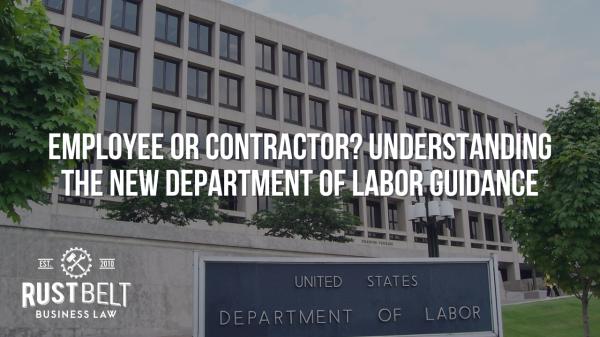Classifying workers appropriately as employees or independent contractors is crucial for compliance and avoiding liability. However, determining the correct classification can be complex with the multifactor legal tests involved.
At Rust Belt Business Law, our employment attorneys provide guidance to employers on proper worker classification under federal and state laws. We want to ensure clients avoid misclassification pitfalls.
The U.S. Department of Labor (DOL) recently finalized new regulations revising the analysis for determining whether a worker qualifies as an employee or an independent contractor under the federal Fair Labor Standards Act (FLSA).
The updated DOL guidance focuses on the long-established multifactor "economic realities test" found in legal precedent. Key factors examined under this test include:
- Opportunity for profit or loss based on the worker's managerial skill, initiative, and business acumen. This suggests independent contractor status.
- Investments by the worker and the potential employer. Capital or entrepreneurial investments by the worker indicate contractor status.
- The permanence of the work relationship. Indefinite, continuous, exclusive relationships suggest employee status.
- Degree of control exercised by the potential employer over the worker and work. More control by the potential employer favors employee status; more control by the worker favors independent contractor status.
- Importance of the work to the potential employer's business. Work critical to core business suggests employee status.
- Worker's skill and initiative, especially in applying specialized skills to business-focused initiatives. This indicates contractor status.
No single factor dictates the outcome under the economic realities test. Classification is based on the totality of the circumstances.
Misclassifying employees as independent contractors illegally denies workers their FLSA rights to minimum wage, overtime pay, and other protections. It also exposes businesses to substantial liability for unpaid wages, damages, and penalties.
At Rust Belt Business Law, we advise clients across all industries to avoid worker misclassification issues. If you have any doubts about how to classify your workers under the FLSA, state wage and hour laws, or tax rules, contact us for guidance.
Our lawyers will thoroughly review your employment relationships and guide minimizing misclassification risks. Don't leave worker status to chance.
FAQs
Q: What did the Department of Labor recently change regarding the test for employee vs. independent contractor classification?
A: On January 9, 2024, the DOL released a new final rule revising the guidance on analyzing whether a worker qualifies as an employee or an independent contractor under the federal Fair Labor Standards Act (FLSA). The rule focuses on the established "economic realities test."
Q: When does this new DOL guidance on worker classification take effect?
A: The new rule goes into effect on March 11, 2024.
Q: What factors does the updated economic realities test look at?
A: There are six key factors examined to determine a worker's employment status:
- Opportunity for profit or loss based on initiative
- Investments by the worker and the potential employer
- The permanence of work relationship
- Employer's degree of control
- Importance of work to employer's business
- Worker's skill and initiative
Q: Does one factor dictate whether a worker is an employee or contractor under this test?
A: No, there is no single determinative factor under the economic realities test. Classification is based on weighing all the factors and looking at the totality of the working relationship and circumstances.
Q: Who can I contact if I have questions about legally classifying a worker?
A: For questions on appropriately classifying workers under federal, state, or local laws, contact us.
Misclassification can lead to liability, so guidance from a trusted advisor like Rust Belt Business Law is advisable. Get in touch today to ensure your business takes a compliant approach to classifying workers.




